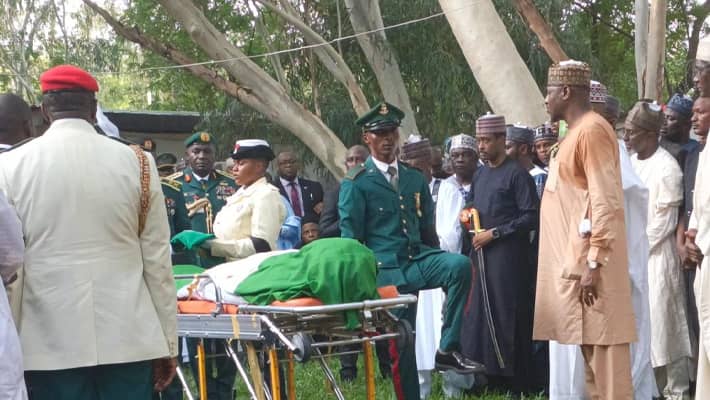Nigeria, on Tuesday, July 15, 2025, bid a solemn farewell to its former President, Muhammadu Buhari, as his remains were committed to earth in his hometown, Daura, Katsina State.
The 82-year-old ex-leader, who died in London on Sunday after a protracted illness, was buried according to Islamic rites in a ceremony marked by national mourning, military honours, and a cascade of tributes from across the globe.
The funeral prayer, led by the Chief Imam of Daura Central Mosque, Sheikh Salisu Rabiu, held at 5:50pm within the premises of Buhari’s private residence.
His body was lowered into the grave shortly afterward as thousands wept, prayed, and honoured the man who once ruled the country as both a military and civilian president.
A Nigerian Air Force jet had flown Buhari’s body from the UK to the Umaru Musa Yar’Adua International Airport in Katsina earlier in the day, accompanied by Vice President Kashim Shettima and top government officials.
At the airport, President Bola Tinubu personally received the late president’s remains. From there, a military chopper transported the flag-draped casket to Daura, where a sea of mourners lined the streets to pay their last respects.
Security was tight but unobtrusive, as residents moved about with quiet reverence, businesses opened briefly, and mosques echoed with Qur’anic recitations.
Senior military officers and service chiefs served as pallbearers, escorting Buhari’s body to the burial site where a 21-gun salute thundered in his honour—a final military farewell to a former Commander-in-Chief.
Among dignitaries present at the burial were Niger Republic’s Prime Minister, Guinea-Bissau’s President, several Nigerian governors, former heads of state, and traditional rulers.
In an act of national recognition, the Federal Government had declared Tuesday a work-free day to honour the deceased leader, allowing millions of citizens to participate in or follow the state funeral.
Despite political divisions, Buhari’s burial united leaders across party lines in grief and remembrance.
Ismaila Ibrahim, a long-time neighbour of Buhari in Daura, described the late president as a man of “unshakable discipline and humility.”
“We lived together in this town for more than 50 years. Even as President, he never stopped returning to Daura. He walked among us like one of us,” he said.
Buhari’s burial drew condolences from world leaders including those from ECOWAS, the African Union, and the United Nations, with many describing him as a statesman who shaped the course of Nigerian democracy and regional security.
His legacy, though polarising, is anchored on anti-corruption advocacy, infrastructural expansion, and a contentious but defining leadership style that spanned decades of Nigeria’s post-independence history.
As the dust of Daura’s red soil settled over his grave, a chapter closed on a life that etched itself into Nigeria’s political, military, and diplomatic memory.
Buhari is survived by his wife, Aisha, and children. His family, surrounded by close associates, remained in sober reflection as thousands continued to visit the family compound to condole with them.
Do you want to share a story with us? Do you want to advertise with us? Do you need publicity for a product, service, or event? Contact us on WhatsApp +2348183319097 Email: platformtimes@gmail.com
We are committed to impactful investigative journalism for human interest and social justice. Your donation will help us tell more stories. Kindly donate any amount HERE




